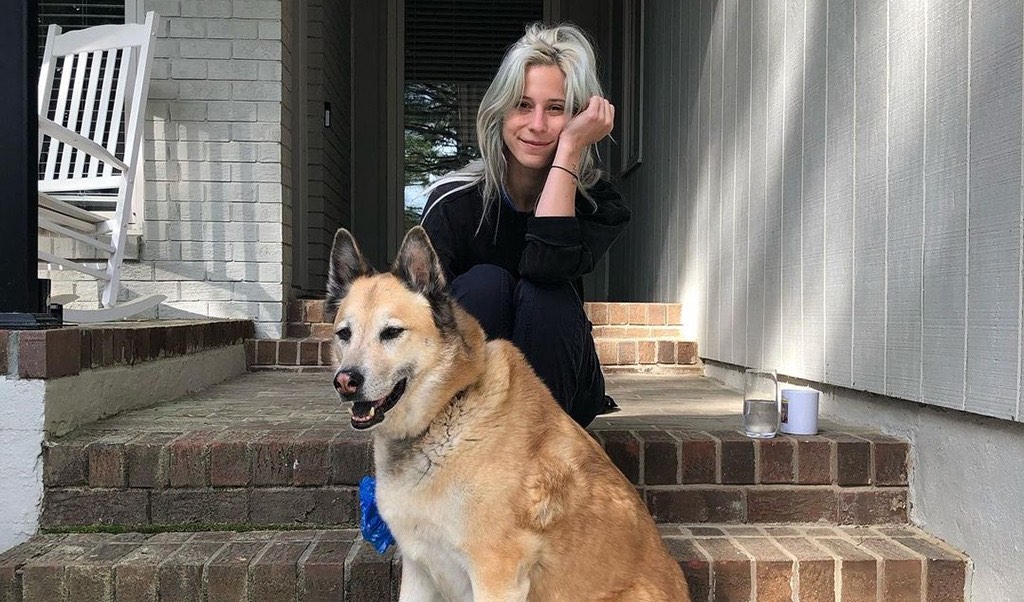It was a balmy summer’s day in 2020 when Alicia Bognanno sat in her backyard with her favored seafoam-green guitar. She was teaching YouTube how to play her rousing new single “Every Tradition.” SUGAREGG, her third album as Bully, would be released in a few days, and it marked a fresh start for the songwriter. Throughout a tumultuous period that culminated in a diagnosis of type-two bipolar and the decision to dismiss her bandmates, there was one supportive constant. “Hiii Mezzi,” Bognanno smiled, pausing the tutorial as a sandy-brown mass of fur ambled into frame. The Shepherd/Husky mix lightly panted from the heat. It looked as though she was smiling. “Uh-oh, guest appearance,” Bognanno laughed. Then she resumed playing.
Every Bully fan knows who Mezzi is and how important she is to Bognanno. “Mezzi was like nothing else that I have ever experienced,” she tells me from her home studio, framed by a collection of electric guitars. There’s a dog bed in one corner of the room. “I had her for 13 years,” she continues. “I learned more through her than through anybody else. We were completely inseparable. She was all I looked at—all day, every day. And to have your support system, your security system, and just everything disappear—it’s substantial; it’s so much more meaningful to me than anything else.”
Thus, Bully’s new album Lucky for You couldn’t be about anything else. “For this record, the priority to me—what it means most to me—is Mezzi and my life,” Bognanno explains. Throughout Bully’s career, reductive comparisons to other women bearing guitars and activist tendencies have flowed thick and fast. Bognanno has been consistently grouped with other (read: literally any) female artists in articles such as this painfully dated one, whose writer seems confounded by the abundance of gosh-darn “girl bands” these days, calling it a “worldwide phenomenon.”
Bognanno has addressed this sexism before, but getting a jump on the misinterpretations, she parked Lucky for You’s two politically charged songs, “Ms. America” and “All This Noise,” at the butt of the album. “It’s really easy to go, ‘Oh, this is a political record’ and look over everything else that was equally as important and life-changing to me,” she says. “I put those [two songs] at the end for that reason, because if I had them off the bat, I risked [people] looking over the idea of Mezzi’s passing or impermanence or grief or learning.”
“To have your support system, your security system, and just everything disappear—it’s substantial.”
While Lucky for You traverses those themes and more—including a shit-hot, flag-burning condemnation of opportunistic legislators (“All This Noise”)—at its core, it’s about love. It’s about Mezzi and Alicia. “Oftentimes the softness in your gaze brought me to the next day / And I couldn’t be more proud of you even if you begged me to,” she addresses Mezzi directly during “A Love Profound,” spoken-word style. It’s one of many beautiful eulogies to her late companion that thread the album together.
“Whenever I wrote or recorded, Mezzi was always with me,” Bognanno explains, “so I was dreading having to write without her sitting next to me. I didn’t really feel like doing anything at all; I just spent a lot of time staring out my window, just contemplating everything. A few weeks went by and I knew that if there was anything I was gonna try it would be writing. I had been avoiding it, but once I did it, it was really sad—but it also felt really good and it was kinda my first step toward functioning normally again.”

“Everything I do in Bully is very, very personal. It’s really hard for me to think of letting someone in.”
The album’s lead single “Days Move Slow” effuses overdue catharsis and light-at-the-end-of-the-tunnel optimism. Propelled by lockstep power chords and a springy backbeat, Bognanno flings open the curtains on a protracted stretch of depression: “And days move slow / I’m living in the same black hole / But there’s flowers on your grave that grow / Something’s gotta change, I know.” Indeed, despite its affecting themes, Lucky for You is decidedly upbeat, from its air-punch opener “All I Do,” which reprises Bognanno’s punky shout-sing as she commemorates three years of sobriety (“I’ll never get fucked up again!”), to “Lose You,” Bully’s poppiest song to date, a fuzzy singalong aided by Soccer Mommy’s Sophie Allison.
“I have a difficult time trusting people,” says Bognanno, “especially musically, because I hold it so close to me. Everything I do in Bully is very, very personal. It’s really hard for me to think of letting someone in.” In addition to her fellow Nashvillian Allison, however, Bognanno’s circle expands to include JT Daly, whose tight, cogent production is the perfect complement to her unambiguous lyrics. “One of my managers brought him up and knew him well,” she continues. “I was super skeptical because I always am, but he was so incredible and supportive—and he was a Bully fan! I could really tell that he wanted to accentuate the parts of my writing that he really likes instead of changing things.”
Lucky for You may not break from (every) tradition, but it is the most precise, open Bully album—the most “Bully” Bully album. Sequestered in her Nashville yard with her dog and her guitars, Bognanno had the time and space to hone the record while remaining an arm’s length from the conglomeration of the music industry, which she eyes with trepidation. “The state of the music industry right now—basically lying in the hands of Spotify and TikTok—is a very strange thing to wrap your head around,” she muses. “It’s really just an algorithm deciding how well your record is going to do. And a little part of me is like, ‘No! If it’s a really, really good record, it’s going to do well!’ But unfortunately, I feel like there are so many other things that come into play. It’s really scary and discouraging.”
So she creates for herself—and, ultimately, for Mezzi too. “I write music and do Bully as an outlet, and it’s always been that way. So the idea of writing something that isn’t personal or vulnerable feels like I wouldn’t be pushing myself. Maybe I’m wrong—maybe there are ways to do that—but, for better or worse, I’m brutally honest.” This approach comes with a mixture of benefits and blowback. “I know there are a lot of people out there who can relate and find parts of it to connect to,” she says, “and that’s what it’s all about for me: everyone feeling less alone, together. So I’ll take the hit of having to run into an uncle who’s like, ‘I didn’t know you liked girls too!’”
“That’s what it’s all about for me: everyone feeling less alone, together. So I’ll take the hit of having to run into an uncle who’s like, ‘I didn’t know you liked girls too!’”
While there are fewer of those personal revelations on Lucky for You, the album is incredibly easy to connect with. Anyone who’s lost an animal companion—who’s lost someone period—will relate, and will agree that those companions never truly leave. Mezzi doesn’t haunt the record, after all; her presence is tangible. She’s standing guard outside the door, continuing to carry Bognanno through the days. Her energy is there behind the stocky, drop-tuned open chords and frolicking guitar leads; the anthemic, nose-scrunching melodies that you find yourself barking out the car window; the one-liners that reduce you to tears, that make you hold your dog and bury your face into her fur and thank her for everything. And even when Bognanno curls up on the bathroom floor and begs for her baby to come back, it’s on a song titled “A Wonderful Life.” The focus is not on Mezzi’s death but on her life.
At the end of our interview, when I inquire whether Mezzi used to come on tour, Bognanno offers a final reflection: “There’s nothing better than playing a show and being done and going in the green room and getting Mezzi. All my favorite things are right here: my dog, my music, my friends.” She pauses, as if a sandy-brown mass of fur, panting from the sun, has just ambled into the frame. Then, as always, she continues playing, adding: “I’m happy that I got to experience it at all.” FL







